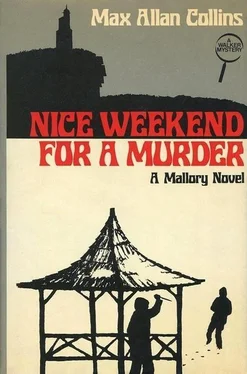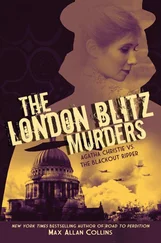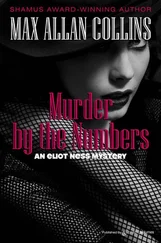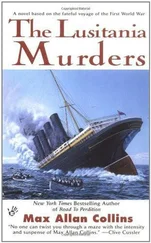“I like him,” Jill said. “He has a gentlemanly manner.”
“He’s a nice man,” I said. “But as much as he hates Kirk Rath, it’s a little surprising he’s here this weekend.”
Tom shrugged. “Pete’s just that kind of guy. He wouldn’t let a louse like Rath spoil his weekend.”
Jill was studying Tom, now. “Are you like everybody else around here?” she asked. “Did you hate Rath?”
“Rath or Sloth?” Tom asked.
Her past tense had confused him.
“Rath,” she said, a little nervously, realizing her slip.
“I don’t hate him exactly,” Tom said. “He’s cost me some money. I lost a series because of him.”
“Really?” Jill said, surprised but trying not to show it. “TV?”
“Books,” Tom said.
“What series was that?” I asked.
“That series I was going to do with a racetrack background. About a detective who worked for the racing commission?”
“Oh, yeah... Didn’t you do one of those?”
“Right. Only I was set to do two more till The Mystery Chronicler hung me out to dry.”
Tom’s bitterness had an edge to it, like the ice in the snow outside.
“What role do you play in Curt’s mystery?” Jill asked. She was doing her best to seem casual; I could read her like a book, however, and like a book I wrote, at that. But maybe Tom couldn’t.
“I’m Rob Darsini,” he was saying, “A boxer turned private eye who is suspiciously like my character Jacob Miles. I was working for Sloth, it seems, but he tried to stiff me for my bill.”
“Cost you money, in other words,” Jill said. “Like in real life.”
“Pete’s character echoes real life, too,” Tom said with a little shrug. “He mentioned it even touches on his having had a friend die by suicide after critic ‘Sloth’ trashed him — which is uncomfortably close to what happened to Pete’s mentor C.J. Beaufort.”
Jill seemed almost shocked. “Isn’t it in rather bad taste of Curt to include such a thing?”
Tom laughed, but it was forced and a little weary. “Cute and nasty, that’s our Curt. Though I think in fairness to him, it should be said it’s Rath he meant to needle. I’m sure he’s as disappointed as the rest of us that Rath split.”
“Disappointed?” I said.
“Sure!” Tom said. “Weren’t you hoping he’d hang around and be the murder victim? Don’t we deserve that vicarious pleasure, at least?”
And he rose and said he’d see us later and left us to our supper.
The entertainment for the evening was Peter Christian’s Charlie Chan movie marathon — three flicks preceded by an informative but not at all dry slide show, with Pete regaling the attentive crowd in the Parlor with anecdotes and little-known facts while flashing onto the screen rare stills, movie posters, and candid shots of the various movie Chans, as well as photos of the oriental detective’s creator, Earl Derr Biggers, and dust jackets of first editions and early paperbacks. From George K. Kuwa, the screen’s first Chan (in an abbreviated appearance in a 1926 silent), to the relatively recent (and disastrous) Peter Ustinov-starring-as-Chan film, it was all there.
And, as a mystery buff and late show devotee from way back, I was enjoying myself; but for my investigative purposes the evening’s entertainment was a bigger disaster than the Ustinov movie. Tomorrow night a dance was scheduled in this time slot, which would be ideal for mingling and casual questioning; however, this was tonight, and movies. In most Charlie Chan films, there is a scene in which all the suspects are gathered in one room and, suddenly, somebody turns out the lights! The situation tonight was similar — all the suspects were gathered here, in this mammoth hall, but the lights were already out. And, unlike a Chan film, where the lights would be out but for a moment, this would be a four-hour haul. In the dark.
Out of courtesy to Pete (and because his presentation was plenty of fun, even for somebody as preoccupied as I was), I sat through the slide show; movie nut Jill insisted on sitting through Charlie Chan at the Opera , during which she bet me a million dollars I didn’t know who wrote the opera Boris Karloff and the others were singing. I won the bet. It was Oscar Levant, and Jill still hasn’t paid up.
When Charlie Chan at Treasure Island started unfolding, Jill grabbed my arm and whispered. “This is my favorite one. I have to see it.”
“What happened to playing Nora to my Nick?”
“All your suspects are watching the movies,” she whispered.
“Culver isn’t here.”
“He was.”
“Well, he ducked out in the last reel of the Opera .”
“How could he?”
“It was easy.” I thought for a moment. “You know, this might be a good chance for me to get him alone.”
Cynthia Crystal hadn’t left; she was sitting with Jack Flint and his wife, drinking in Sidney Toler’s finest Chan.
“I’m watching the movie,” Jill said. “It’s only an hour. See you at the room, after?”
“What about the next Chan up?”
“It’s a Roland Winters. I like it okay, but enough’s enough.”
“I’m glad to hear you say that. I don’t know if I want to hang around with a woman who’d sit through three Charlie Chan movies.”
Somebody in the row in front of us turned and said, angrily, “Shusssh!” Quite rightly, too — generally I feel people who talk during movies should be shot.
Feeling guilty for violating one of my own rules, I rolled my fingers at Jill in a Stooges wave and slinked out of the Parlor.
I went to Culver’s room, which was just a few doors down from ours, and knocked. No answer.
So I began exploring the mountain house, wandering its endless halls, occasionally finding little covens of Mystery Weekenders, who were playing hookey from the night’s entertainment to keep working on their solution to The Case of the Curious Critic . Since a number of the gamesters were puzzle fanatics as opposed to mystery fans, their absence from the Chan festival, and their obsession with working on the puzzle, made sense. Using “sense” loosely.
Anyway, they were here and there, in the little sitting rooms with the plush furnishings and the fireplaces, many of which were going now, the snow piling up outside the frosted-over windows. Strangely, I’d heard no one complain about being stranded. Perhaps that was because all of us were, in a manner of speaking, stranded here already, and of our own free will. Being snowbound merely added to the atmosphere, whether Ten Little Indians — Agatha Christie, or The Shining — Stephen King.
I should have been depressed, I supposed. A man had died; I’d seen him killed one day, and found his body the next. That I had done both seemed wildly coincidental to me, certainly nothing I’d try to get away with in one of my books. But it had happened, so what was I supposed to do about it? You can start over in fiction; in life you’re stuck with what you’re dealt.
But I felt a certain charge out of the situation — being snowbound, having a chance to try to find out “whodunit” before the police got here (tomorrow or Sunday or Monday or whenever the hell snow and fate allowed), having one up on the murderer by knowing about the murder when he or she thought it had gone as yet undetected and, well, it was exciting. I was like any other Mohonk game-player — I enjoyed the challenge, and I wanted to solve the puzzle.
At the same time my more rational self was cautioning me not to consider this a game; to remember the ghastly slashed face of Rath (as if I could forget) and to keep in mind that the person I was pursuing had committed that violent crime. It might be a Christie situation, but some King-style violence was in the air.
Читать дальше












